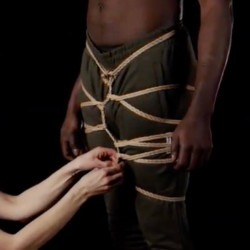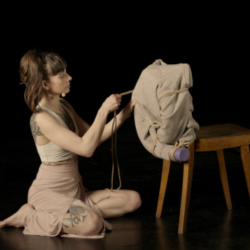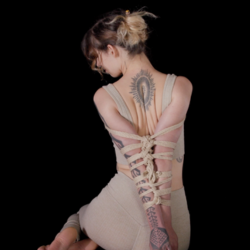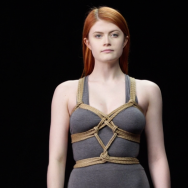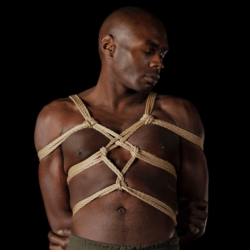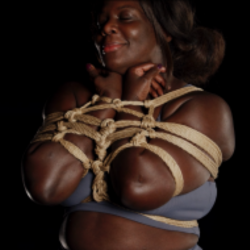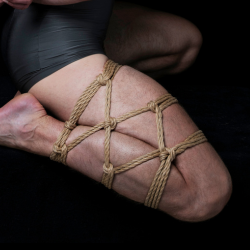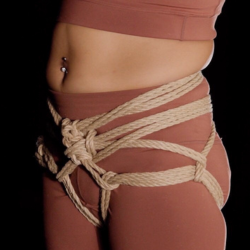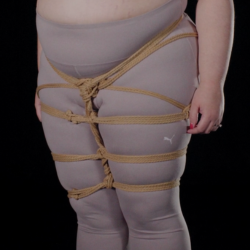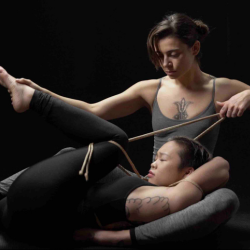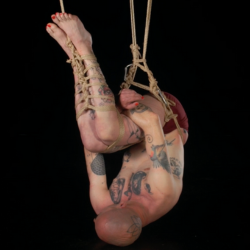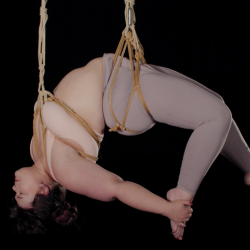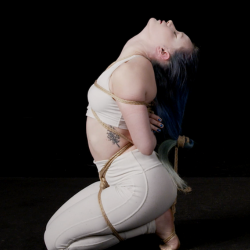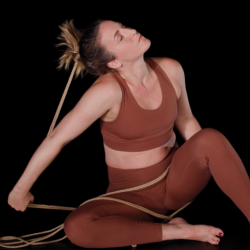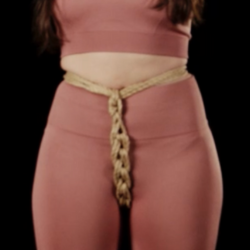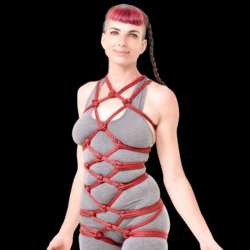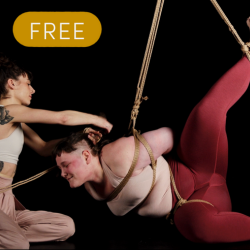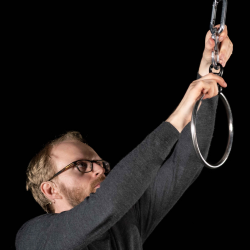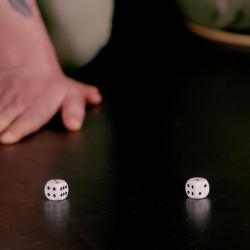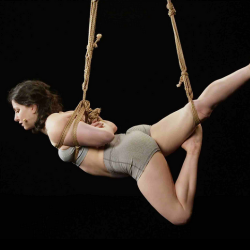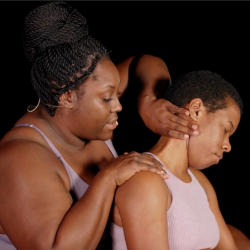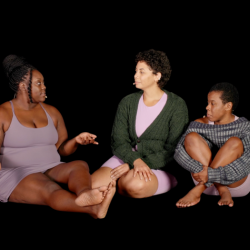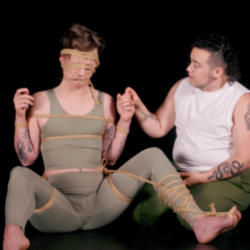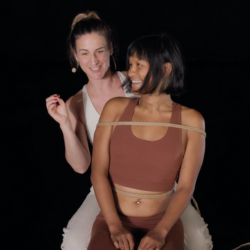EP 54
LAVENDER
Lavender emphasizes breaking down barriers by sharing knowledge and creating inclusive spaces. She explores her journey into kink and rope, the value of emotional connection, dismantling gatekeeping, and building community through intentionality and shared experiences.

Lavender is a rope bottom and PC gaming enjoyer. Other than rope she enjoys wax/knife play, whips and electricity. She continuously strives to connect with LGBTQA+ communities of color in their rope journey and doing knowledge/skill shares.
Instagram: @fawntastiic_
[00:00:08] Wren Hello to all my guys, gals and non-binary pals. Welcome to the Shibari Study podcast. I'm your host, Wren. Shibari Study is an online learning resource offering video tutorials for beginners through advanced practitioners. Whether you're brand new to the world of shibari and needing to learn the basics, or a seasoned rigger or rope bottom seeking inspiration to push your practice to new places, there's something for you at shibaristudy.com. Today, I'm talking to Lavender. Lavender uses she/her pronouns. She's a rope bottom in the Atlanta area. Lavender does many things. She's a space holder, a facilitator, a community builder. I'm so excited to chat with you today Lavender, how are you?
[00:00:54] Lavender Good. It's so good to see your face.
[00:00:57] Wren You too. So give us the origin of Lavender. When did you find (…)? What appealed about it to you? That kind of stuff.
[00:01:10] Lavender I would say when I first found (…), I was in my mid-twenties. What appealed to me was just like that sense of community. Like, all these people are getting together to do and engage in these... These acts that have been talked about or previously and still viewed as like taboo, like, I didn't see it that way. I'm just like, Oh, this looks like... I want to try this. I want to engage in this. How do I do the thing?
[00:01:40] Wren Yeah. What is it about rope specifically? Did you see rope, or did you see other general (…) behavior? What was it about rope that drew you in?
[00:01:52] Lavender I love and enjoy the restrictiveness of it. The challenge that it gives me to dance along this edge of a limit that my body has and then maybe go off of that edge into something else. Like feeding off these others, like, like energy, facial expressions and going through this, like, moment in time of shapes and exploration. I don't know. It's hot as (…).
[00:02:22] Wren It is. It sounds like you're very intentional about rope. It sounds like you really value that space and that time with your rope top.
[00:02:32] Lavender I do. Going to like, rope conferences or just like meeting up at, like, festivals to engage in rope. Can I say it's a love language?
[00:02:42] Wren I would say that it is a form of a love language. The phrase rope as a language is used often, and I do think that it is a form of a language. It's pretty neat that you and I see each other, and we immediately have something that we can talk about. It gives us something in common immediately.
[00:03:02] Lavender And like always, like, growing and learning.
[00:03:06] Wren Do you have any favorite things that you've been inspired by? Where do you get inspired from?
[00:03:15] Lavender Oh, there's so many folks. We'd be here for a minute, but like I just, I get inspired by those around me that I see at conferences and of course, and now, like, with Instagram, I'll scroll a little bit just to see what's going on and be like, Oh my God, this is like... Just everybody, all the people that have been fortunate and thankful enough to like, share space with and see in person, I'm just like... Phew.
[00:03:46] Wren What do you really value in rope? What is good rope to you?
[00:03:51] Lavender The laughter, the eye, the non-verbal communication that happens between two people. And that energy exchange of it. It's, it's, it's... Oh, it's so good. And when, when they know how to just (…) you up just right? Like, like, like waist rope. That's my (…). I can just, Uh, I very much value more like that emotional connection. We don't have to go up in the air. We don't have to. Like, we can stay on the floor. We can stay on the floor. We can do a partial. If that exchange is good...
[00:04:28] Wren Then that's all you need.
[00:04:29] Lavender All you need.
[00:04:30] Wren I wish that was something more people would put at the front of their minds. It doesn't really matter what you're doing. I want to be doing something with someone that I like and someone that I trust and understand what I want out of the scene. I'd rather practice TKs with somebody that I like, rather than go up and do a crazy sequence with someone that I'm not really that into.
[00:04:57] Lavender That I value having that emotional connection and then engaging in rope with people.
[00:05:02] Wren What are some things that you do to... I don't know if emphasizes the right word, but to grow that emotional connection with somebody. Is there anything you do specifically? Or is it just a thing that's kind of there.
[00:05:18] Lavender A little bit, a little bit of both. I also make sure that, like, I spend time with that person and what that looks like, it's like, Oh, hey, let's catch up at a conference. Let's grab some coffee and learning about that other person outside of rope, like, Oh my gosh, can we get to know people outside of the rope thingies? Because it's like you, you're multi-dimensional being with so many interests and hobbies and things like, can we just– I just want to sit there and celebrate it all.
[00:05:47] Wren Yeah. That's one of the things that I like about this podcast is there are people that do many things, and the intersections of those things are so interesting to me.
[00:05:58] Lavender So that's what I really try and do. And then with friends, if they're like cool with that, I always ask every year, I'll send them like a Christmas card, like I can't buy you a gift. But you know what, my (…) can sit down and I can write you a handmade Christmas card to put in the mailbox.
[00:06:14] Wren Cute. That's adorable. How long have you been doing that?
[00:06:19] Lavender Going on year two. I had to get out of that mindset of like, Oh, some– you know, physical, like tangible monetary gifts.
[00:06:28] Wren Yes. Well, that's the most important thing is time and intention behind a gift. And that also does come into rope. It doesn't matter what you get or what you do. It's the intentional love that's put into the activity. I know that obviously community is huge for you. It's a through line in everything you've been talking about and you were discussing skill shares and spreading info. Why do you think it is important that we spread this info and make it available to everyone?
[00:07:04] Lavender It gets rid of that gatekeeping (…).
[00:07:06] Wren Yeah, it does. It really does.
[00:07:08] Lavender And sharing that information with, like, others who might not have that access or means to get to it, is so important. Like not everybody has the funds or mobility to get out here to do stuff. So if you have that ability to get out here, do the things and take all of this information. Why, why wouldn't you want to, like, spread it?
[00:07:41] Wren Yeah. We talk a lot about rope is for everybody, but this is something that's often forgot about is access.
[00:07:49] Lavender Yeah. Just wanting to build and strengthen a network of folks where we can have that active, you know, skill share dissemination of information like, Oh, some people up in Nashville might have access to stuff that we don't have down here. Okay. Can we work together to kind of bring that information, like down here? Bring it over to the like, West, whatever.
[00:08:15] Wren You were talking about, how it's important to maintain physical spaces and you're talking about that specifically in the South, that spaces are closing sometimes, and why it's important to maintain these hubs that people can gather at and learn. What does a physical space lend itself to?
[00:08:35] Lavender It gives people another space together. Like if you do not feel comfortable or don't want to be at this one space, then know that there's another space that you can go to and exist in. Now these spaces are a spectrum, of course, because it's like we're already... When you think of (…), we're already like– it's marginalized, I guess. I don't know how it gets... I've been so disconnected from like mainstream media of how like (…) get shown I have no idea what goes on and then I'll– oh, it always gets me with (…) spaces, I don't know like, the music. The musicality of (…) spaces chaps my (…) sometimes.
[00:09:22] Wren I forget who said this, and I've talked about this before in this podcast, but I forget who said this. But somebody was like talking about black folks in dungeons and feeling not welcome. And they're like, the music is nothing that's– it's white people music. And it's small (…) like that.
[00:09:42] Lavender How hard is it to create a playlist that incorporates more than the stereotypical dungeon songs you hear?
[00:09:53] Wren Yeah. Something that I have observed is white people that are forming dungeons or spaces or parties want to be inclusive. So try to ask marginalized people. Hey, come and help and look at the rules. And that doesn't make any sense, because they're written through the lens of whiteness and cis het normality versus having somebody actually coming in and, like, spreading the chairs in the room that are making those decisions with trans folks, with people of different gender identities and sexualities and colors like...
[00:10:42] Lavender We like, we make too much sense. It's like, how hard is it to just get a collective.. Like different... Different voices at a table. Give us a seat at the table goddammit. Actually, you know what? (…) it. If I can't get at the table, I'll kick it down, I'm gonna make my own table. How about that? Cause y'all do piss me off. Like... And, oh, I don't know. It's like, what's wild to me there's two– these two spaces that I inhabit. Like the (…) and the like my, my vanilla life, I see so much overlap. I'm like, Wow, you still don't give a (…) about black or brown bodies. You don't give a (…) about what I have to say. You're telling me to sit down, shut up. Go. And I'm like... ugh.
[00:11:31] Wren Yeah, that's (…).
[00:11:32] Lavender If I had more money. Damn you best believe it. My philanthropy would be on.
[00:11:38] Wren What is one of your favorite scenes? Do you have any favorite scenes in mind that you've had? Favorite times in rope?
[00:11:48] Lavender I was out in LA visiting some friends, and we did the rope outside near the Science Museum. And it was, it was my favorite. Like it was, the sun was shining. We had music going, and also we saw a man getting a (…). Right behind us. And I was like...
[00:12:15] Wren Wow, you're– honestly, out of all the people for that to happen in front of, you all the best group for it to happen in front of.
[00:12:23] Lavender Yeah. We were like, all right.
[00:12:26] Wren So it sounds like the thing that made that scene really great was the general vibe of the day. Was the group. Was just the the time. Was the activity.
[00:12:37] Lavender Yeah, it was just activity. We had no, no set like, Yeah, you're going to do this and then go into this. It's like, What do you feel like doing? Let's (…) around and find out.
[00:12:46] Wren I love that. That's so cool. You were talking about being pushed to the edge and you were talking about waist rope and how you love a really heavy waist rope. And I've seen you get tied a bunch, and it seems like you do enjoy a lot of physical challenge and to be pushed. What is your relationship with pain in rope?
[00:13:08] Lavender It feeds into and reminds me that I am strong and that I am capable. If there's something that my body just can't do that day, I can always try it again. Like there's nothing wrong with... I guess 'failing'.
[00:13:26] Wren You said there's nothing wrong with failing and you used air quotes. Can you tell me what that means and why you used air quotes there?
[00:13:35] Lavender Some think they have to last a very long time in a certain pose, or especially, I guess, mainly related to like in the air. Oh, you have to do this entire crazy sequence. You have to last X amount of time. And if you don't last X amount of time... Boo. You fail. You didn't... You didn't do it. And why I put air quotes because it's like, well are you in that person's head? That, that, it's not a fail to them, you know? They got to, they lasted two more, two more minutes or whatever much longer than they did previously. It's about the progress.
[00:14:13] Wren Yeah. No one is privy to the internal dialog going into somebody's head when they're being tied.
[00:14:22] Lavender It's just like when you wake– did you like, did you wake up today? Did you drink water? Yes? All right. Did not fail today. You did the damn thing. Good job.
[00:14:32] Wren You're very right. Did you get out of bed? Sweet.
[00:14:35] Lavender Did you get out of bed? Awesome.
[00:14:37] Wren You're doing it.
[00:14:38] Lavender You're doing great.
[00:14:40] Wren You were talking about the idea of filling cups. And filling each other's cups and making each other feel full in a way. And I'd be curious how your cup gets filled.
[00:14:54] Lavender [00:14:54]I know... One thing that's just like– [1.6s] will always fill my cup is just like... It's very cheesy, but spend- spending time with folks, you know? Taking that time to feel like, Hey, if I'm over that way, I'd be like, Hey, I'm in town. Do you want to grab a coffee? Do you want to do something, like, just like... Because who knows, you know when we will, like, see each other again. You know, that's what really fills my cup, is like being [00:15:20]intentional [0.0s] and spending time.
[00:15:21] Wren Yeah. So in wrapping us up, you are a huge proponent of community. You want people to know each other and talk and network and share knowledge. And you were saying that you are in the middle of building community and gathering people. Can you talk to us a little bit about that? What does that look like?
[00:15:42] Lavender For me, what that's been looking like, is just going to like the respective, like, other like, (…) spaces. Like absorbing how things are done there. What materials and education that they offer. And... Not comparing it, but be like, all right, how... Like I see, I see you. This is some good (…). How can I not only support you in continuing that you, you, to do this really incredible things. But also can I, how can I take this knowledge that I received to better inform and support those closest to me in the local community, and also adding on top of that my strengths. Stuff that I can bring to add to it.
[00:16:38] Wren Yeah. What are some things you like that educators are doing? What do you think makes a really good educator?
[00:16:45] Lavender Ooh, them being honest. Like I really value their honesty and their willingness to be vulnerable during the classes, when they're sharing their, like sharing their knowledge, have a little intimate moment with what they are sharing. I don't know if that makes sense.
[00:17:04] Wren It does. Absolutely. It sounds like what you're alluding to is people being authentic and people being real about their mistakes and things that they've learned.
[00:17:14] Lavender Yes, yes, yes! Because I want to hear about that. As someone who– I want to hear about the mistakes, I want to hear, I want to hear about your growth and what, like, you are inspired by it.
[00:17:27] Wren Yeah. Hearing about teaching through learning is the best way that it can be done. You want to hear about people that have learned things through (…) it up. Where can people find you if they want to connect with you?
[00:17:45] Lavender Yeah. You can find me on Instagram. fawntastiic_ with an underscore at the end.
[00:17:56] Wren Amazing. Well Lavender, thank you so much for sharing your knowledge. Thanks for talking with me today.
[00:18:04] Lavender Thank you for having me.
[00:18:06] Wren You're welcome.


